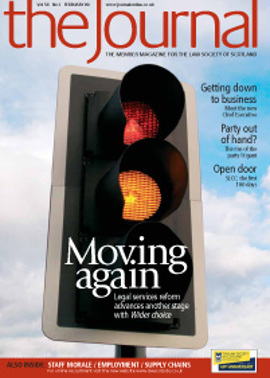Take a business view

The current economic climate is a weighty backdrop to the publication of the Government’s consultation paper “Wider choice and better protection”. Some legal firms are having to face up to hard times, falling income and redundancies. Being a partner is not what it once was, and for the first time the prospect of solicitors going out of business is unhappily upon us.
Those taking a more businesslike approach to their operation may be better positioned to see through the current challenges, and yet the onset of the more commercially-focused alternative business structures (ABS) is still not welcomed by every lawyer.
ABS will allow non-solicitor shareholdings, external investment and ownership and the formation of multi-disciplinary practices. Even in non-“credit crunch” times this is, for me, a sensible development to create a more modern and competitive profession. But with ABS comes greater regulation and for some, that is a huge price to pay for a system that “ain’t broke”.
The consultation paper is now driving forward the changes and scope of the legal profession of the future and sets out proposals for regulation and a new regulatory body.
Under the heading of who will regulate, the Government is minded against a separate regulatory body as in England & Wales, where the Solicitors Regulatory Authority (SRA) has been established. This is part of the Law Society, but operates at arm’s length as an independent regulatory body whose purpose is to protect the public by ensuring that solicitors meet high standards and by acting when risks are identified.
However, the split is not straightforward, with the SRA not able to operate completely without reference to the Society.
The alternative – and preference – is for the Law Society of Scotland (LSS) to become both regulator of ABS and promoter of the profession. This is not as easy to argue. The combination of roles could make it harder to demonstrate the independence of regulatory decisions.
LSS is currently undertaking a governance review to convince the Government of its competency to carry out both roles. Inevitably, it will lead to the involvement of more non-lawyers within the LSS Council.
However, by keeping everything “in-house” we are better able to create a community of interest between the profession and the public, while ensuring the reputation of the profession remains intact.
Under the heading of “how”, the consultation paper puts forward that individual lawyers, as members of a regulated body, would continue to be regulated by that professional organisation.
But the big shift is that the new regulator (in whatever form) would also regulate the entity, the ABS. The legal services provided by the ABS entity, whether a small or large part of a wider business, should be clearly defined in order to be subject to the regulations. Effectively, we are looking at regulation on two levels.
It also talks of regulating “proactively – satisfying itself that the business is operating proper systems of management, oversight and quality controls”. And here lies the rub. Not only would this give the regulator the power to set down rules for the governance of ABS, it would also give it the authority to scrutinise how a legal firm is run – not simply look at client accounts as now.
The current plight of the banks has raised the issue of “capital adequacy”. Within the debate about the future regulation of legal firms, this too has become a matter for solicitors and whether this test should be similarly applied. The question that “capital adequacy” poses is whether a firm has enough cash reserves to deliver its services should their income dry up. Can a firm survive, for instance, for three months without income?
It is a crude yet simple safety valve – but at what cost? Is it really practical to ask a small legal practice just setting up to lock away such a cushion? It could put entering the profession out of reach of many.
Or is the alternative for solicitors to accept a greater level of auditing of their accounts?
Regulation to my mind is cultural; and good practice something embedded within the heritage of the profession. It is hard to understand why more regulation is needed when the risk to the consumer is only theoretical and the impact on the lawyer is a reality. Except, of course, that modernisation of the profession is long overdue and the process of change is inevitably painful.
In some ways, the process is a little behind England & Wales, where new partnerships will be permitted from this spring. But the Scottish Government seems determined to bring forward full ABS models by spring 2010. So whilst there is some catching up to do, the opportunity exists for solicitors in Scotland to press ahead and create a new infrastructure that is inclusive and collaborative rather than exclusive and divisive. Under the terms of the consultation paper, there is the potential for us to be masters of our own fate.
In this issue
- Cross-border disputes: new rules
- Beyond the downturn
- Take a business view
- Amber alert
- ARTL - time to reflect
- Jack to the future
- Party time
- Head of steam
- Big names for Society's big date
- Employment: without prejudice
- Simple steps
- Taken on credit
- Positive returns
- Electrical storm on the horizon?
- What's on file?
- Ask Ash
- New cases, old problems
- Fair sharing of less
- Beware - simpler rules
- Shifting sands
- Offer you can't refuse
- Website review
- Book reviews
- Weakest link
- Servitudes - new ground?






